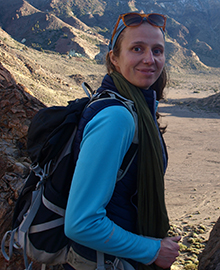Dr Sophie Wynne-Jones
Senior Lecturer in Human Geography

Affiliations
Contact info
s.wynne-jones@bangor.ac.uk
01248 382639
Room F24 Thoday Building
http://bangoruniversity.academia.edu/SophieWynneJones
twitter @SWynneJ
Overview
Research Interests
Sophie is a human geographer working on Sustainable Agriculture and Rural Environmental Governance. This includes research on:
1) Net Zero and Sustainable Agriculture: behavioural insights on farmer decision-making and practice; land-use policy and governance changes; collaborations and partnership.
3) Rural/Environmental Knowledge controversies: how different stakeholders interact and agree on appropriate strategies for landscape futures, including proposals for tree planting and rewilding.
2) Human-Nature relations: e.g. for rewilding; understanding their more-than-human geographies, socio-cultural underpinnings and political-ecological implications.
She has recently completed an ESRC funded Policy Fellowship with Welsh Government’s Strategic Evidence Unit for Climate Change and Rural Affairs on ‘Agricultural Behavioural Insight’ and is now co-leading the Net Zero Transition Thematic Group for the UKRI funded Rural Wales Local Policy Innovation Partnership.
She has previously served on the Royal Geographic Society's 'Participatory Geographies Research Group' - and has a longstanding commitment to public scholarship and participatory working.
Current Projects
Governance and Policy
Rural Wales Local Policy Innovation Partnership Net Zero Transition Thematic Group co-lead. The LPIP is a three-year research partnership designed to connect researchers, stakeholders and communities in generating, sharing and applying evidence to enhance local policy and innovation for inclusive, sustainable growth in Rural Wales. This is envisioned through the framework of the ‘wellbeing economy’, which prioritises an economy designed to deliver social justice for current and future generations on a healthy planet in which citizens are actively engaged in their communities.
The Supporting the Net Zero Transition Thematic Group focuses on challenges for businesses, landowners and communities in rural Wales in negotiating the transition to a net zero economy and society. These include projected changes in rural land use and farming practices (e.g afforestation, increased renewable energy production, land management for ecosystem services), and associated shifts in the mode of income-generation in the rural economy, as well as prospective impacts on rural communities, businesses and service provision from the removal of carbon-based transport and energy. Opportunities for innovation to support sustainable behaviours and practices are also covered.
ESRC Funded Policy Fellowship with the Strategic Evidence Unit for Climate Change and Rural Affairs. Providing agricultural behavioural insight to support the net zero transition. This included research support for policy development on the Sustainable Land Management and Agriculture, specifically the Sustainable Farming Scheme https://www.gov.wales/sustainable-farming-scheme and Soils Policy Statement. I also provided research support for Marine Policy on Coastal Community Capacity Building https://www.gov.wales/coastal-community-capacity-building-evidence-synthesis-report
Rewilding
Rewilding is a longstanding research interest, which I have published widely on. As a social scientist I am interested in the socio-cultural influences behind rewilding, as well as the reasons for conflict surrounding it. Most recently I have been working with the IUCN CEM Rewilding Thematic Group | IUCN to develop their Guiding Principles for Rewilding principles_of_rewilding_cem_rtg.pdf (iucn.org). We also developed this short article to share some of our key learning on the social dimensions of rewilding. Rewilding: four tips to let nature thrive (theconversation.com) I discuss some of these points as part of the Zoological Society of London's podcasts on rewilding in a changing climate https://www.zsl.org/zsl-wild-science-podcast
My work has particularly focused on the development and difficulties surrounding rewilding in a Welsh context, where I have worked with rewilding practitioners and stakeholders to evaluate current projects, assessing values, wellbeing, and processes of change. This includes projects which have evolved to take a different approach, whilst still adopting some core principles and inspiration from rewilding like https://www.cambrianwildwood.org/ and https://tircanol.cymru/
I have also worked to bring academic insights and stakeholders together across Europe to explore the potential for rewilding through a Ser Cymru grant on ‘Rewilding in a Changing Europe: Opportunities, Threats and Shifting Geographies of Land-Use’ https://rewildinglandscapes.wordpress.com/
Sustainable Agriculture
Strategies for Circular Agriculture to reduce GHG emissions within and between farming systems (CircAgric-GHG) - CoI ERA-NET Cofund (SusAn, FACCE ERA-GAS, ICT-AGRI-FOOD and SusCrop) This project is designed to unravel mechanisms by which farming systems can enhance circularity, reduce GHG emissions, and provide ecosystem services at multiple scales. It involves 17 world-leading researchers from 8 countries with expertise in livestock, cropping systems, farm and landscape modelling, LCA and ecosystem services. The consortium will draw upon state-of-the-artknowledge, research methods and models to assess how circular practices can deliver sustainable food systems. https://www.circagric.org/
Contact Info
s.wynne-jones@bangor.ac.uk
01248 382639
Room F24 Thoday Building
http://bangoruniversity.academia.edu/SophieWynneJones
twitter @SWynneJ
Teaching and Supervision
Governing Society and Environment (course leader)
Introducing Human Geography
Critical Thinking in Geography
Becoming a Researcher
Environmental Data and Analysis
Geography Field Study
Agriculture and the Environment
Social Issues in Forest Management
I also supervise student projects at undergraduate, Masters and PhD level.
Research outputs (29)
- Published
“You don't have to perform for the trees”: The longer-term effects of nature-based interventions on wellbeing
Research output: Contribution to journal › Article › peer-review
- Published
Social Return on Investment of Nature-Based Activities for Adults with Mental Wellbeing Challenges
Research output: Contribution to journal › Article › peer-review
- Published
Finding common ground: Co-producing national soil policy in Wales through academic and government collaboration.
Research output: Contribution to journal › Article › peer-review
Projects (5)
Summit to Sea / O’r Mynydd i’r Môr Project
Project: Research

